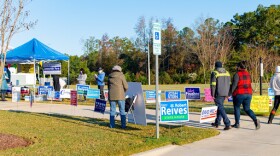North Carolina cities and counties would be prohibited from being “sanctuaries” for people living in the country illegally, under a bill tentatively approved by the Senate on Thursday.
The plan would prohibit local governments from directing their police officers to not collect people’s immigration information and report it to federal authorities. Senate Republicans gave the initial nod in a largely party-line vote of 34 to 11. The House of Representatives would have to agree before sending the bill to the governor.
The Protect North Carolina Workers Act is at least partially a response to a fatal shooting in California this summer by an undocumented immigrant who was released by San Francisco police instead of being turned over to immigration authorities. A handful of North Carolina cities, including Asheville, Carrboro and Durham, have approved ordinances directing their officers to not check a person’s immigration status unless they’re suspected of a serious crime.
“Any city that would do that needs their charter revoked,” said Sen. Jerry Tillman (R-Randolph).
Primary Elections in March, Not May
North Carolina primary voters may be heading to the polls in March, instead of May, next year.
The House and Senate approved a bill Wednesday to move the primary elections on March 15th.
Republican leaders argued it would make North Carolinians more relevant in the presidential race.
“I think it'll be one of the biggest turnouts we've ever had in the state and…that's what you want,” Senator Harry Brown (R-Onslow) said.
But many Democratic lawmakers, like Senator Jeff Jackson (D-Mecklenburg), said it would give challengers in statewide elections less time to pull their campaigns together.
“One of the side effects (of the bill) is to make voters less relevant in electing all of us. That makes this bill disturbingly self-serving,” Jackson said.
The bill now heads to Governor Pat McCrory.
Sales Tax For Public Schools
Counties would be allowed to increase sales taxes to fund their local school districts under a bill that advanced in the House Thursday. The measure would let counties levy up to a 0.5 percent additional sales tax if their residents approve the increase by referendum.
Revenues could be spent to fund teacher and teacher assistant salaries, to maintain school district property or to support community colleges. Most counties could surpass their current sales tax caps to add the new tax.
The House will take its final vote Monday before the bill gets sent back to the Senate for concurrence.
Supporters say the bill will allow counties to raise more money for their schools. But Democratic Rep. Paul Luebke (D-Durham) said the measure isn’t the right way to increase education funding.
“It puts the burden on the middle class and on the working poor—on the poor, in a way that the sales tax always does, is which is a regressive tax hurting people more at the bottom,” Luebke said in a finance committee on Wednesday.











